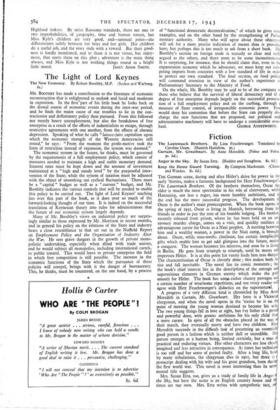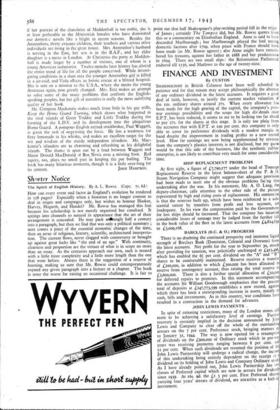Fiction.
The Lautensack Brothers. By Lion Feuchtwanger. Translated by Caroline OraM. (Hamish Hamilton. 95.) Curtain, Mr. Greatheart. By Anne Meredith. (Faber and Faber. 9s. 6d.) Anger in the Sky. By Susan Ertz. (Hodder and Stoughton. 8s. 6d.) Keep the Home Guard Turning. By Compton Mackenzie. (Chatto and Windus. 8s. 6d.)
THE German scene, during and after Hitler's drive for power in the early 'thirties, makes a fantastic background for Herr Feuchtwanger's The Lautensack Brothers. Of the brothers themselves, Oscar the elder is mucb0 the most spectacular in his role of clairvoyant, while Hannsjorg, not less a rogue, has more humble ambitions, and in the end has the more successful progress. The development of Oscar is the author's main preoccupation. When the book opens in the spring of 1931, Oscar is living in Munich, borrowing from his friends in order to pay the rent of his humble lodging. His brother, recently released from prison, where he has been held on an un- savoury murder charge, comes on a visit, and quickly outlines an advantageous career for Oscar as a Nazi prophet. A meeting between him and a wealthy woman, a power in the Nazi camp, is brought about. Oscar, while nine-tenths charlatan, has certain inexplicable gifts which enable him to get odd glimpses into the future, makes a conquest. The woman becomes his mistress, and soon he is living in Berlin. He goes from triumph to triumph, until he meets and impresses Hitler. It is at this point his vanity leads him into danger. The characterisation of Oscar is cleverly done ; this makes both his rise and fall inevitable. The novel has its comic moments ; but the book's chief interest lies in the descriptions of the corrupt and superstitious elements in German society which make the path smooth for Hitler. The book has soma.rather clumsy passages and a certain number of wearisome repetitions, and not every reader will agree with Herr Feuchtwanger's didactics on the supernormal. A progress of a very different kind is chronicled by Miss Anne Meredith in Curtain, Mr. Great heart. Her hero is a Victorian clergyman, and when the novel opens in the 'sixties he is on th point of meeting the young woman destined to become his wife. The two young things fall in love at sight, but l'er father is a prou and powerful dean, with greater ambitions for his only child th a mere curate. In spite of all the obstacles placed in the way their match, they eventually marry and have two children. Mi Meredith succeeds in the difficult task of presenting an essential( good person in a fashion which is neither dull or incredible. H parson emerges as a human being, limited certainly, but a man practical and enduring virtues. Her other characters are less clear! imagined and less attractive in consequence. At times her tec.hniqu is too stiff and her sense of period faulty. After a long life, bes by many tribulations the clergyman dies in 1911, but there is postscript dealing with his wife and his great grandson, born dur the first world war. This novel is more interesting than its song mental title Suggests.
Mrs. Susan Fitz, too, gives us a study of family life in Anger the Sky, but here the scene is an English country house and times are our own. Mrs. Ertz writes with sympathetic tact,
if her portrait of the chatelaine of Meddenhall is too noble, she is at least preferable to the Miniverish females who have dominated our domest c novels like a blight in recent seasons. Besides the Anstruthers, thirty evacuee children, their teachers and various other individuals are living in the great house. Mrs. Anstruther's husband is serving in the East, her son is in the R.A.F., and her elder daughter is a nurse in London. At Christmas the party at Medden- hall is made larger by a number of visitors, one of whom is a young American isolationist. Twelve months later history has altered the entire trend of life for all the people concerned. While investi- gating conditions in a slum area the younger Anstruther girl is killed in a air-raid, and Viola effects an heroic rescue at a blitzed hospital. She is sent on a mission to the U.S.A., where she meets the young American again, now greatly changed. Mrs. Ertz makes an attempt to solve some of the many problems that confront the English- speaking peoples, but her gift of narrative is really the most satisfying quality of her book.
Mr. Compton Mackenzie makes much from little in his gay trifle, Keep the Home Guard Turning, which shows what happened in the rival islands of Great Todday and Little Todday during the forming of the L.D.V. and its development into the ubiquitous Home Guard. A pompous English retired stockbroker, Paul Waggett, is given the task of orgaaising the force. He has a weakness for fizzy lemonade in his whisky, and makes an excellent target for the wit and wisdom of the sturdy independent islanders. Mr. Mac- kenzie's islanders are as charming and refreshing as his delightful islands. The theme is spun out by a feud between Waggett and Major Donald MacDonald of Ben Nevis over a. missing boot. Red tapery, too, plays no small part in keeping the pot boiling. The book has many hilarious moments, though it is a little over-long for



























 Previous page
Previous page